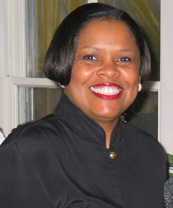 Valda Boyd Ford, director of UNMC’s Community and Multicultural Affairs, has completed the prestigious Health Partners Fellowship, sponsored by the W.K. Kellogg Foundation. The fellowship ended in September.
Valda Boyd Ford, director of UNMC’s Community and Multicultural Affairs, has completed the prestigious Health Partners Fellowship, sponsored by the W.K. Kellogg Foundation. The fellowship ended in September.
Ford and her 11 co-fellows spent 24-months exploring the nature of communities, academic institutions and the linkages between them. They also received intensive learning experiences about collaboration between such entities as government agencies, social service agencies, academic medical centers, non-profit corporations and community based organizations.
Fellows in the Health Partners Fellowship Program met five times each year for one-week training courses at the International Center for Health Leadership Development (ICHLD) on the campus of the University of Illinois at Chicago. The group also took extended field trips, nationally and internationally.
Fellowship activities focus on the importance of making community connections. All major funding resources for non-profit organizations recognize the need to collaborate, and many grant programs require collaboration. Most people in public health have been involved in networks and partnerships involving friends and colleagues, but knowing the theories behind collaboration and learning – that there are actual steps to take in improving the success rate of collaboration – can be major advantages.
“The overall approach of this fellowship was to foster the development of a group-learning process and to establish a network of colleagues and ongoing support to improve bridge-building skills,” Ford said. “I have had some outstanding educational opportunities in my career, but this fellowship was the most productive in terms of learning and applying networking as a science.”
The Health Partners Fellowship Program, itself, began in 1998 as a strategic alliance between UIC and the W.K. Kellogg Foundation. There is a competitive selection and recruitment process, conducted at the national and international levels, to identify 12 fellows for each class. Fellows – who retain their own professional positions during their study at UIC – are in mid-career, represent academic institutions as well as community-based organizations, and have wide-ranging experience in the health care field.
Ford’s class of 12 was selected from 140 applicants and included international scholars, executives, researchers and federal regulators from Columbia, Chile, Australia, the Caribbean and the United States. At their training meetings, they exchanged ideas, participated in classroom and experiential learning activities with scholars in the fields of global and local health issues. In her two years, fellowship activities took Ford on numerous occasions to Chicago; as well as to El Paso, Texas; Ciudad Juarez, Mexico; and Newcastle, Australia.
The ICHLD is now an internationally acclaimed training ground on how to increase the leadership capacity within community organizations and academic institutions to create partnerships that address local health needs.
“Whether you are based at a university, hospital, foundation, health department, local community organization, or health clinic, this program is about building real relationships with the community you’re serving,” said ICHLD Director Virginia Martinez. “It is also about employing techniques and tools to ensure that key participants are identified, included, and retained during the life of the partnership.”